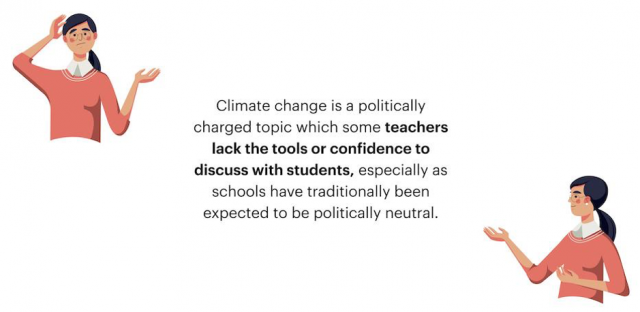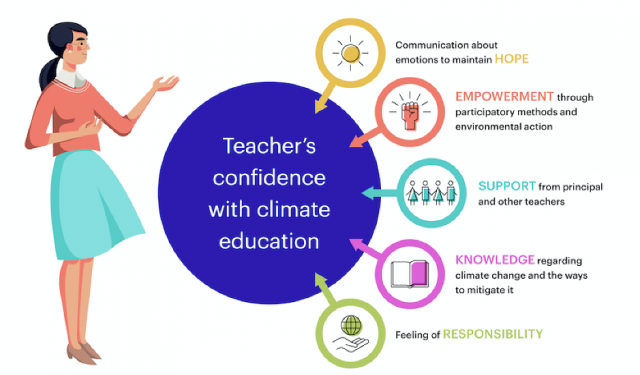This blog post reports on work-in-progress within the Design for Government (DfG) course! The post is written by one of the groups dealing with the project brief on ‘Boosting climate education’ provided by the Ministry of Environment (YM) in collaboration with the Ministry of Education and Culture (OKM), the Finnish National Agency for Education (OPH) and the ORSI research project. The group includes Paula Ikonen, Aybars Senyildiz, Zhiwen (Wen) Yap and Felix Zelck.
Halfway through the project, it’s time to look back and look ahead. After an initial kick-off workshop to gain a range of perspectives and clarify the project brief, we extended our research together with different actors involved in climate change education. To understand the broader landscape, we conducted 13 interviews with governmental staff, researchers, principals, teachers, and authors of climate education materials. At the end of this intensive research, we narrowed down our focus and defined the further direction of the project.
It’s all about the individuals
Six weeks into the project, there is one thing that has become absolutely clear: it’s not policy, the curriculum or educational materials that drive climate education but people. Everything comes down to individual passion, curiosity and a sense of mission. Even though climate education is a topic as large as the planet itself, only a fairly small proportion of people are actively engaged. So even now that climate issues are increasingly covered by popular media, education on climate change remains a young field driven by just a few pioneering actors.
The challenge of neutrality
There are various reasons why climate education is difficult to implement, but two aspects make it even more difficult than other subjects: it is vast and potentially political. Both these factors make it difficult for teachers to be confident incorporating climate education into their teaching.

Historically, the Finnish education model has given a lot of autonomy to teachers, though many of them also believe they should not impose any particular political views on students. The combination of teacher autonomy and political caution can create a conflict where teachers feel insecure about whether or not to speak about certain aspects of climate change and unsure about what to say. This eventually results in avoidance of the topic in general. In addition to that, climate education is not a clearly defined subject, but a wide field that connects scientific, emotional and ethical knowledge, as well as hands-on experience. This complexity can easily overwhelm teachers, contributing to their feeling that they are not well-informed enough to teach it to students.
Empowerment is needed
From the insights we gathered, we see that the highest potential to boost climate education lies in helping in-service teachers to feel more comfortable and passionate about including it in their subjects. We found five factors to be especially important impacting teachers role in climate education:
- Hope: Teachers need to communicate openly about the complex emotions involved in climate change.
- Empowerment: Teachers have to realize that they don’t need to know everything, but they can place themselves on an equal level with students to learn about climate change together in a participatory process.
- Support: Teachers should be able to receive guidance from fellow teachers and principals in initiating climate change education.
- Knowledge: Teachers need reliable knowledge and materials on climate change and climate education. However, they should also not feel like they have to know all the answers before they are entitled to discuss the topic with students.
- Responsibility: Teachers have to feel responsible for doing climate education well, in order to fulfill the schools’ larger responsibility as an engine of society.

While this covers quite a range of points, solutions don’t have to address all of them at the same time. As one of our interview partners said,
“I have never met a Finnish teacher that doesn’t want to learn more.”– Minna Lapinniemi, Special education teacher
We hence think that finding ways to help in-service teachers gain the confidence to navigate climate education could bear the most fruit in amplifying climate education. The question for the rest of our project, therefore, will be in exploring how this can be done best.
The DfG course runs for 14 weeks each spring – the 2020 course has now started and runs from 25 Feb to 19 May. It’s an advanced studio course in which students work in multidisciplinary teams to address project briefs commissioned by governmental ministries in Finland. The course proceeds through the spring as a series of teaching modules in which various research and design methods are applied to addressing the project briefs. Blog posts are written by student groups, in which they share news, experiences and insights from within the course activities and their project development. More information here about the DfG 2020 project briefs. Hold the date for the public finale 09:00-12:00 on Tuesday 19 May!
